#not to be anti christian clearly
Text
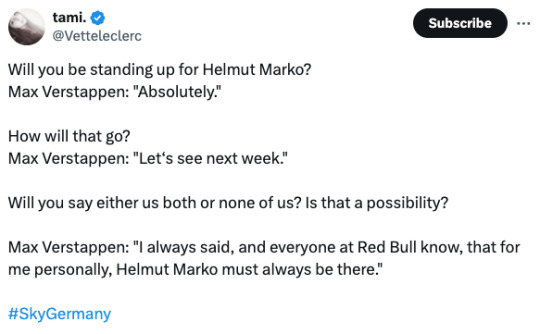

what the fuck is happening lmao
#my post#max verstappen#red bull need to pick christian vs. max/helmut#cause CLEARLY that's what the issue is here#max and helmut are anti christian now lmao
301 notes
·
View notes
Text
the more i learn about vivziepop the worse it gets
#adam text#i tried to watch the first ep of hazbin hotel on amazon and:#a) it's bad. the writing is bad. even without knowing anything else it's Bad#b) in that vein the whole premise is hades/persephone for christians but it's their daughter#c) i need people to actually understand tropes & religious archetypes before they make 'satire' of them#d) i've seen all the stuff about her transphobia now & i need ppl to realize that she can be anti-transmascs WHILE ALSO clearly fetishizing#trans femmes#anyway just sounds like she's a bigoted plagiarizing weirdo#and i wish she had watched something other than invader zim as a child
16 notes
·
View notes
Text
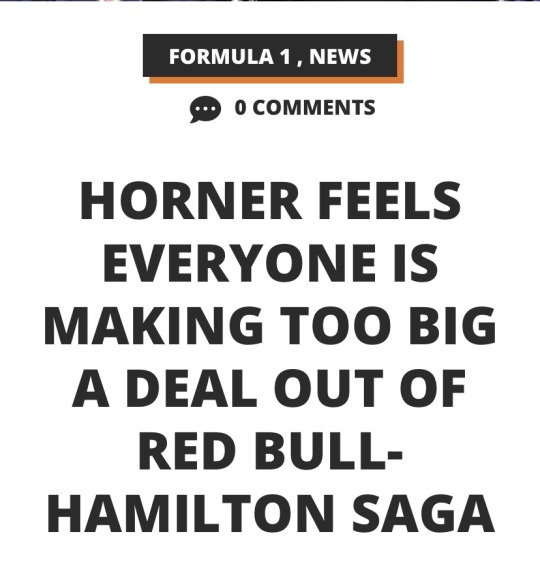
Someone please remind me because I seem to have forgotten: who started it again?
#Geri seems to be busy cause clearly someone is not getting the attention he wants#anti christian horner#hard to believe that is a tag only it’s not#abu dhabi gp 2023
2 notes
·
View notes
Text
All of the responses I keep reading on the antitheist post (because I hate myself I guess) about hell being abusive to teach children all going "actually you're just talking about CHRISTIANITY because JUDAISM doesn't believe in hell" as if Christianity and Judaism are the only religions ever. as if there aren't literally thousands upon THOUSANDS of religions out there in the world that have some kind of concept of hell that is used as a form of power and control to scare children and threaten people into submission within it. But sure, your one or two religions you can mention off-hand that don't have a hell-like concept are the reason the "antitheist" part of the post should be written off and the reason you can try to reduce the post to "just being about christianity". ok.
#txt#I hate to tell you this but you cannot make that post about one singular religion because it APPLIES to many#and it IS an anti-theist position to take in a world where MOST theistic religions have a concept of hell?????#sorry all of the “just say christianity. this post is clearly only about christianity.” responses to OP's post are SO ANNOYING#and if you glance for a second you can see countless people in the notes saying “yeah i was raised with [non-christian religion] -#- and our concept of hell traumatized me”#there's like this strange thing where bc people are scared of being racist they somehow think that criticizing organized religion is racist#like if you believe all Muslims are terrorist bombers that want to kill you then THAT is Islamophobic!#But criticizing a religion for it's religious qualities being used to harm people within it is possible to do#without being racist/islamophobic/antisemitic/sinophobic/etc#Like I don't know how to tell you that Christianity isn't the first or the last religion to have hell in it!#and like that literally IS a cartoonishly evil thing to threaten children into behaving with! Which many religions do!#and there needs to be a space where people can be ex-[non christian religion] without feeling lost & alienated & shouted down!
4 notes
·
View notes
Note
there are circles of tumblr outside the one you exist in, by the way. there are a lot of christians here lmao
it was a joke my dude
#the monarch’s court#both responses to both those asks were meant to be jokey#bc who tf just goes preaching in peoples inboxes#and then Obviously the ‘I’m a heretic bc I use tumblr’ one was. a joke. it’s a website#there’s very clearly nothing anti-christian about A Website
15 notes
·
View notes
Text
The atheism tags on this site are a toxic mess.
#the people on there make extremely white western and christocentric takes on atheism#atheism is a broad term and includes a wide variety of philosophers and scholars#many of which are not from western and Christian dominated countries#i hate to break it to you guys but the angry anti theist atheists aren't all there is#too many people on this site have very clearly never deconstructed or questioned the belief or lack of belief that they were raised with
9 notes
·
View notes
Text
I was fine with gandalfs mommy milkers and the various shit posts and the art and all of the other blaze posts I've seen on my dash. But I'm drawing the line at these fuckin Christian posts I've seen every time I've opened this app today. Get it away.
#right thing#lords work#very much in an aggresively anti-christian mood lately due to some childhood *stuff* being brought up#so no im not apologizing#fuck you if you think forcing your religion down someones throat who clearly isnt interested is the or the#youre brainwashed sorry not sorry#fuck the church#goblin rambles#personal#rant#delete later?#probably not no one reads my posts anyways let alone the tags#grouchy goblin
6 notes
·
View notes
Note
What do you think of Joyofsatan.org? They claim to follow the Sumerian God Enki-Satan, they’re pro-choice, they follow gay Pagan Gods and they’re the largest Satanist group in the world.
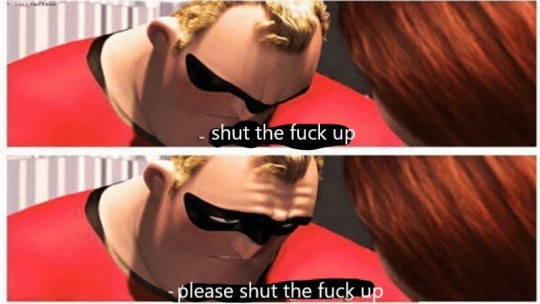
#anyways go spread your misinformation other places i don't want any thanks :)#actually on second thought‚ don't. just. don't spread misinformation like this. don't go to pages that clearly don't want to interact with#blogs like yours because your beliefs and actions clash with their beliefs and actions#just don't try to pretend you're engaging in good faith when you in fact are not#if any of y'all see this please just report them for spam it's p clear that's what they are#i am proudly:#anti catholic#anti catholicism#anti christianity#anti religion
7 notes
·
View notes
Note
I'm watching people on Reddit start praising Alex Jones for his comments on the genocide in Gaza and I feel like bashing my head against the wall. "Please do not fall for the obvious grifter's obvious grift, I am begging you".
He has changed his position on Israel more times than I've been able to keep track of. Half of his audience are anti-Israel because of the Conspiracy antisemitism, and he other half are pro-Israel because of the Christian Zionist antisemitism. He keeps doing everything in his power to avoid any deeper conversation about the topic.
Its clear he has no actual views on the topic, but is also struggling to find a line that his audience will swallow. Last time I heard him talk about it, he was taking some sorta "Anti-Israel because their government is run by the Shadow Government, but pro-israel in that their citizen militias have the right to bear arms, and they're killing arabs." Which is, and I shouldn't really have to say this, desperate nonsense.
I have an iron stomach when it comes to this type of fascist nonsense, but to be frank, hearing Alex talk about it is sickening to me. I can't even tune in to listen to him struggle. He clearly does not know or care about Palestinian history, or the sociopolitical complexities of the region. He's never fucking cared about antisemitism, or Jewish people. His opinions on the topic are depraved, hollow, and beneath every person reading this.
#antisemitism#I cannot properly express my sheer contempt for anything alex jones has to say about palestine or antisemitism
550 notes
·
View notes
Text
Love, Guilt and Other Wounds
Aaron Hotchner x female reader
When Aaron and his partner are taken hostage, he has to break her heart to save her life.
Warnings: angst, hurt/comfort, a little bit of domestic fluff, mention of blood, injury (non-graphic), hostage situation, knives, cannon-compliant themes of violence, non-detailed discussion about religion (Christianity), themes of childhood abuse, please let me know if you want me to add anything else.
Word count: (less than I expected, sorry) 3.7k
Request here! | Masterlist
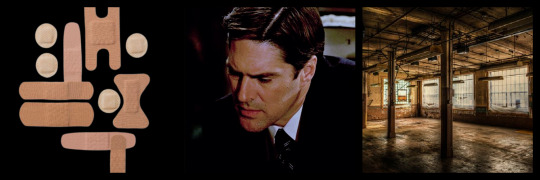
"Of course, I’ll hurt you. Of course, you’ll hurt me. Of course, we will hurt each other. But this is the very condition of existence. To become spring means accepting the risk of winter. To become presence, means accepting the risk of absence".
- Antoine de Saint-Exupéry
Aaron isn't sure if he believes in a God or a higher power. He was taught to read scripture; and spent Sunday mornings perfecting his posture in church pews-- starched shirts and neckties pulled too tight. The preacher's sermons left him wanting-- wondering how this man of God could stand over his congregation preaching every week, and not see all the lies they were holding back. How could he not see the secrets Aaron seemed to read so clearly? At just fourteen Aaron knew who was having an affair and with whom. He could see which children feared their fathers. Every pew had another story, another family growing together, or falling apart. The hypocrisy of it all drove him mad, and he imagined standing from his seat to shout it, overwhelmed as he realized he had unintentionally become the keeper of everyone's secrets. He learned that everyone in that church was a liar in their own right, and he hated it. But, when he left for college, his mother called to ask if he was still going to church on Sundays, and he lied and said yes.
He should have paid more attention. Maybe then he'd understand how he ended up here. Perhaps it's some sick retribution. A cosmic evening of the scales; his penance for his sins. He just wishes you weren't here with him. How dare he think he could love someone when all he's ever done is punish those who love him? His hands are stained with blood; he taints everything he touches.
Very early on in his career, Aaron learned he couldn’t take cases personally. As devastating as it was to have another victim show up while hunting a killer, it wasn’t a personal failure. Compartmentalize. Use logic. Move forward. He repeated the process again and again. Logically he knows that he is not responsible for the actions of the aggressive sociopath who is now holding the two of you hostage; but, he blames himself for not keeping you safer, for bringing you with him, and for putting you in harm's way. He knows he will not recover if you don’t make it out of here. He won’t forgive himself.
The profile said this man would be anti-social. Physically, he’d be small in stature. It was clear he’d been sneaking up on his victims. He had been taking couples, knocking out the men with a blow to the back of the head, and then the women. It’s a method that the team had seen before, common for UNSUBs without the social ability to lure their victims, or the physical strength or confidence to attack head-on. But they had not profiled that he would escalate to taking out his targets with a taser.
After six days in San Diego, the team finally had a lead on two rental properties in the UNSUB’s comfort zone. One was an old tyre factory, listed as a multipurpose warehouse and storage space; the other was a large storage facility in an industrial neighbourhood. Both units had been paid for in cash, both offered the privacy and space required to hold and torture two people for days at a time. The team split up, Hotch and you arranged to meet the owner of the factory space to find out more about who the renter was and gain access to the property. With no response from the owner of the second property, Morgan, Prentiss, and Rossi headed over to check it out.
The two of you had only been on the property for five minutes before Aaron had been incapacitated and taken out. He had foolishly made his way into the building while you ran back to the SUV to grab your jacket. Out cold, there was nothing Aaron could do to stop you from meeting the same fate.
It’s not his fault. But he feels like it is as he watches you shiver from across the room. He can’t be certain how much time has passed, but it feels like hours. He can only hope that you’re being kept in the building you were attacked in, that the team will connect the dots and come and get you, but until then you’re stuck. He watches, nauseated as your eyes flutter open, and then shut again. You’re concussed, he doesn’t need to be a doctor to know that. His ears are ringing, and he’s sure the blow he took to the head has at the very least temporarily worsened his hearing.
“Doesn’t the FBI have rules against fraternization?” The UNSUB wonders out loud, waving a knife around as he walks towards you.
“What makes you think we’re a couple?” Hotch asks, as he tries to work his hands free from the rope that binds them behind his back, “She’s just a colleague”.
It’s a lie. But it needs to be said. Compartmentalize. Use logic. Move forward. Buy time, shift the UNSUB’s interest away from the two of you. Ruin the fantasy.
“I think I’ve been doing this long enough to know a couple when I see a couple, Aaron,” the man taunts, obviously proud of himself. He’s feeling emboldened having taken two FBI agents, but that works in your favour. He’s getting cocky, too full of himself. It’s a level of confidence he isn’t used to having, it just gives him a higher height to fall from. Compartmentalize. Use logic. Move forward. “I think it’s time we wake your girlfriend up,” the man says, his hand gripping tightly at your hair, your head tugged back without remorse.
Aaron resists the urge to cringe as he hears you groan, your face twisted with obvious pain as you’re rudely awakened. “She’s pretty. What’s she doing with you?”
“I told you. She’s a colleague”.
Your eyes are unfocused, scanning the room trying to make sense of what is going on.
The man raises the knife, holding it to your throat. This time Aaron blinks, desperate to control his expressions and micro-expressions. In this scenario, the less he cares about you, the safer you are.
It’s the burden of being tied to him. Time after time his love destroys people.
The blade presses closer to your throat. Aaron controls his breathing.
“Impressive agent Hotchner. But I’m still not convinced,” the UNSUB moves the blade but pulls your head back further. Your eyes meet Aaron’s, “Do what you’re going to do, he doesn’t care,” you say. You’re speaking to the man with the knife in his hand as much as you’re speaking to Aaron. He weighs his options, his heart pounding as he watches you hold your breath, willing the tears to leave your eyes. It’s the permission he needs but doesn’t want. Compartmentalize. Use logic. Move forward. He knows you’re doing the same, telling him to break your heart to save your life.
“Please, Hotc--”.
He doesn’t let you finish, “Just shut up for once. Please,” he thinks the words cut through him more than they cut through you. Knowing his cruelty is a lie does little to soften the blow, and it breaks his heart to be the one throwing it.
But this is all he’s good for, isn’t it? Letting people down. Surely it’s not just coincidence that so many of those who have dared to love him end up damaged. One way or another he destroys people. Who is he to say that he’s the one who is suffering when it’s he who does all the damage?
Even as a child, he couldn’t help it. He thinks perhaps he inherited his sharpened tongue and lack of patience from his mother. She loved him in her own way but could never show it without first tearing him apart. Her biting words, and regular beatings. Prentiss had been right when she once said he was distrustful of women-- unfairly so. Not all women carry the hateful, spiteful heart his mother had. Very few had ever turned their rage at the world and their shortcomings into a personal and violent rage against him. He grew weary nonetheless. Better safe than sorry.
At a young age, it became clear to him that there were few things, if anything, as important to his mother than appearances. On Sundays, she fussed over his clothes and his posture. She lectured him on table manners from the moment he could hold a fork. His room had to be spotless. His grades had to surpass average. Long before his brother was ever born, he learned how to live up to her expectations. But still, there was always something she could find him lacking in, an excuse to take her open fist or wooden spoon to his skin, a reason to send him to bed without dinner. He remembers crashing into the china cabinet trying to escape her one night. She was mortified on Monday when he had to walk into school on Monday with a cast around his arm. “Make sure they know this was your fault,” she told him. Perhaps I was built to fail, he had thought. She loves me and I embarrass her. I will only ever let her down. God, how disappointed she would be to see him now.
Seconds feel like hours as the UNSUB leers expectantly. The man's mouth twists into a smile when he sees the tears forming in your waterline again. Aaron watches your fist clench presumably to distract yourself from the migraine that matches the pounding in his head, just as much as it is to pull your attention away from the hurtful lies he's about to weave.
“You were supposed to have my back,” Arron spits with faux vitriol. “You had one job and couldn't even manage to do that”. Compartmentalize. Use logic. Move forward.
“From the moment you showed up I knew you'd be a problem”.
He continues to try to work his hands out from the binds. He can feel the knot loosening as he continues to buy the two of you time. “Aaron,” you beg, tears slipping down your cheeks now.
“Following me around with some school girl crush. Look where we are now,” Aaron breathes.
He can feel his father’s rage resting on his shoulders, as heavy as his hands were when he used to pat him on the back. It’s a quiet burning, far more silent than his mother’s anger, but it’s there and threatening him all the same. A silent shame; a fear induced by the knowledge that he’s failing but not being able to stop it. His father lived like a ghost in their home, just as Aaron has learned to haunt his life. He only ever raised his voice when he drank, but even then his hatred was self-directed. A sorrowful self-pity. A cry for help. The affairs, the gambling, the drinking; the man punished himself, stumbling home to a house with a vengeful wife, a silent boy, and a crying baby. It was a heart attack that finally killed him, but Aaron never doubted his father had stopped living long before that.
Aaron breaks his own heart as he delivers each verbal blow. He hopes you understand. He prays that just maybe your concussion might leave the memories of this moment blurry. Selfishly, he begs you to forgive him, because he won’t forgive himself.
He can see the way your wrists strain against your restraints. The UNSUB adjusts his grip on your hair as you struggle to distance yourself from him. Your eyelids flutter and he knows your vision must be swimming but you don’t give up. With a sadistic grin, the UNSUB wipes at the tear stain on your cheek with fake sympathy, grasping your jaw roughly he forces you to look straight at Aaron, “Poor girl… guess boss man doesn’t care about you after all. What a waste,” he sighs his breath heavy against your cheek, as he moves to hold the knife to your throat again, “She’s so pretty,” he directs his commentary at Aaron this time.
“Oh, don’t get me wrong. I’ve slept with her. How couldn’t I when she was practically throwing herself at me?” The words taste bitter on his tongue as he speaks them. His stomach churns as he continues, “But what we have certainly isn’t love”.
It couldn’t be further from the truth. Aaron grounds himself choosing to remember the quiet morning you two had shared only a few days earlier. Waking up without an alarm but with Jack sneaking in to jump up on the bed. As he watches you cry now he recalls how you had smiled so brightly at the little boy, ruffling his hair and cuddling Jack into your side. He had watched with a smile of his own as you bargained with his son, promising pancakes in exchange for ten more minutes of sleep on your shared day off.
You crept into his heart so slowly he had hardly noticed. Until one day, he looked up from the bright pink sticky note you'd left on your recent report, reminding him not to work too hard; he knew, without a doubt, he was in love with you.
For so much of his life, Aaron conditioned himself to expect a fight around every corner. He learned to make sacrifices from his happiness in fruitless attempts to keep peace. For the first time in forever he's been feeling like maybe, just maybe, he's enough. You’ve been more than patient with him; understanding his hesitance to open up to people again. You don't get upset with him for working late, but you scold him for not getting enough sleep and skipping meals.
He smiles more. He cracks jokes the way he used to. You've helped him see the forest from the trees-- healed parts of him he didn’t know needed mending. He's tried to do the same for you. He's watched you open up and trust the team more. He's seen the way your confidence has grown and he can't take credit for your growth, but he's enamoured by the transformation just the same.
You deserve better. You deserve better. You deserve better. The thought echoes in his head the same as it does most days. But now, it’s louder. The voice in his head matches the volume of the ringing in his ears, and the rushing sound of his pounding heart. Compartmentalize. Use logic. Move forward. He fights to remind himself, but the UNSUB is laughing now. Taunting you and your emotions, and there’s nothing Aaron can do but sit there and watch. He struggles to feign indifference, watching as you continue to make yourself smaller. It’s only then that he notices that you too are working your hands out of the rope that restrains you. The UNSUB was stupid enough to tie your wrist in front of you.
Aaron’s eyes focus on the bandaid wrapped around your index finger. You cut yourself making dinner last week. He could have sworn his heart melted when you turned to him holding your hand out, blood beading already. “Aaron, where do you keep your first aid kit?” you’d asked. Your brows furrowed, and your lips pouted. “In the bathroom, the cabinet under the sink,” he’d answered with no intention of letting you go off and tend to your wound alone. Instead, he guided you down the hall, his left hand looped in a gentle hold around your wrist, his other hand on your waist.
Once you were sat on the countertop he took great care, making sure the wound was cleaned before he bandaged it. “My hero,” you teased, leaning in for a kiss.
A simple cut he could manage to fix. Jack promised you could use as many of his Star Wars bandaids as you wanted while you healed as well. A little love and patience could make it better, a philosophy he adopted to heal Jack’s scraped knees, and schoolyard bruises. But the sight before him now is far worse than any kitchen mishap could be.
Your nose is still bleeding. Bruises have already begun to form, red marks turning deep purple with every passing minute. He knows that your concussion is something you'll recover from. The contact burns from where the taser touched your skin will become new skin someday soon. The cuts and scrapes will scab over and then disappear.
Aaron worries the damage he's done can never truly be ameliorated. Your compassion is unmatched. It’s what makes you a good agent, a good partner, and someone Jack can turn to. You are forgiving. God knows you've excused enough of his behaviour. But, he doesn't deserve to be absolved of this guilt. He will carry this day around in the darkest corner of his heart; the same place he holds the memory of Haley and how he failed her. The words “what we have certainly isn't love,” will linger uneffaced by time or kind words.
The squeak of an old door opening piques Aaron's interest. The UNSUB doesn't react. Seemingly only interested in tracing the tear tracks on your cheeks. Your eyes are closing again. It's over now, he wants to tell you. He wants to hold you; comfort you; to apologise because you deserve to hear it anyway.
“Paul Simpson. FBI,” Morgan’s voice booms, “drop the knife and put your hands where I can see them”. Prentiss and Dave come to stand next to Morgan, their guns trained on the newly identified perpetrator. Aaron bites his tongue so hard he can taste blood-- it's all he can do to stop himself from bursting into a fit of bitter laughter. We win, he wants to say.
Disarmed and handcuffed, Paul is escorted outside by Morgan and two members of the local police. Prentiss and Rossi make quick work of untying you and Aaron.
“Aaron?” he can hear you mutter, breathy and quiet.
“Yeah, I’m right here,” he promises kneeling at your side. Your eyes are glazed and unfocused as you nod and tip forward. Unconscious, your entire body falls forward into Prentiss’ arms. Aaron’s voice joins Rossi in calling for a paramedic.
The doctors assure him that you’ll wake up soon. They dealt with his injuries quickly. Bruised ribs are the worst of his injuries. A cut at the back of his head and the taser burns were patched in only a few minutes, though he’ll readily admit he was far from a good patient. Too anxious to keep still much to the nurse’s dismay.
You’re still asleep. A major concussion will have you out of the field for much longer than he knows you’ll be happy with. He makes a mental note to start setting aside some extra paperwork for when you inevitably start hounding him for something to do. With the lights in the room dimmed, and a comfortable silence settling he allows himself to indulge in the illusion that everything might be alright between you.
With your hand in his, he breathes deeply trying to focus. He prays to a God he’s not sure he believes in. And when the quiet starts to get to him, he speaks out loud, as silly as he thinks he may look. He tells you about the phone call he had with Jack earlier and lets you know that Jack has a new painting he can’t wait to show you when you get home. Your hand squeezes his, encouraging him to keep talking.
“Aaron?” your eyelids flutter as you adjust to the light. The nurse had them turned to the dimmest setting but it’s still far more than you feel immediately capable of coping with.
“Yeah, honey,” he affirms. You release the breath you’re holding your brow relaxing.
“I love you,” you tell him. Your voice is steady and steadfast. Your resolve is impressive, unwavering and determined as you focus on making eye contact with him. “It’s not your fault,” you promise. He’s sure you don’t expect the weight on his shoulders to lighten instantaneously. You’ll tell him every day that he’s not to blame; intent on chiselling away at his guilt, shrinking it down before it manages to consume him.
“I love you,” he swears. He knows it won’t squash any of the doubt he’s planted. Aaron knows there will soon be days that the niggling insecurity threatens to break what you’ve managed to build together; when the worry that you aren’t enough seems louder than it ever has before. He won’t blame you if you decide it isn’t worth the pain of staying with him. But, he’s hell-bent on loving you through it. He can only hope that it’s enough.
626 notes
·
View notes
Text
So the real crime of fascism was the application to white people of colonial procedures "which until then had been reserved exclusively for the Arabs of Algeria, the 'c***s' of India, and the 'n***s' of Africa." (p. 36) Here we must situate Cesaire within a larger context of radical black intellectuals who had come to the same conclusions before the publication of Discourse.
As Cedric Robinson argues, a group of radical black intellectuals,including W.E.B. Du Bois, C.L.R James, George Padmore, and Oliver Cox, understood fascism not as some aberration from the march of progress, an unexpected right-wing turn, but a logical development of Western Civilization itself. They viewed fascism as a blood relative of slavery and imperialism, global systems rooted not only in capitalist political economy but racist ideologies that were already in place at the dawn of modernity. As early as 1936, Ralph Bunche, then a radical political science professor at Howard University, suggested that imperialism birth to fascism. "The doctrine of Fascism" wrote Bunche, "with its extreme jingoism, its exaggerated exaltation of the state and its comic-opera glorification of race, has given a new and greater impetus to the policy of world imperialism which had conquered and subjected to systematic and ruthless exploitation virtually all of the darker populations of the earth." Du Bois made some of the clearest statements to this effect: "I knew that Hitler and Mussolini were fighting communism, and using race prejudice to make some white people rich and all colored people poor. But it was not until later that I realized that the colonialism of Great Britain and France had exactly the same object and methods as the fascists and the Nazis were trying clearly to use." Later, in The World and Africa (1947), he writes: "There was no Nazi atrocity-concentration camps, wholesale maiming and murder, defilement of women or ghastly blasphemy of childhood which Christian civilization or Europe had not long been practicing against colored folk in all parts of the world in the name of and for the defense of a Superior Race born to rule the world. The very idea that there was a superior race lay at the heart of the matter, and this is why elements of Discourse also drew on Negritude's impulse to recover the history of Africa's accomplish ments. Takirng his cue from Leo Frobenius's injunction that the "idea of the barbaric Negro is a European invention," Cesaire sets out to prove that the colonial mission to "civilize" the primitive is just a smoke screen. If anything, colonialism results in the massive destruction of whole societies-societies that not only function at a high level of sophistication and complexity, but that might offer the West valuable lessons about how we might live together and remake the modern world.
Robin DG Kelley's A Poetics of Anti Colonialism, published as introduction to a new edition of Aime Cesaire's Discourse on Anti Colonialism
594 notes
·
View notes
Text
A ruling by Quebec’s highest court upholding the law banning religious symbols to be worn by public sector employees in the workplace is “dangerous” and a “fascistic approach to human rights”, a Canadian anti-hate organisation said Friday, Anadolu Agency reports.
The secularism law, known as Bill 21, bans employees, such as teachers and police officers, from wearing religious symbols at work. Included are Muslim hijabs, Christian crosses, Sikh turbans and Jewish kippahs.
In a 200-page decision made public Thursday, the court upheld Bill 21 and also extended it to cover English school boards that had previously been exempt.
“Clearly the judges on the panel care little about the human rights of the communities primarily affected by the law who all happen to be racialised religious communities or the bigotry and racism that the law enables,” Canadians United Against Hate founder, Fareed Khan, said in a news release.
Full article
Tagging: @politicsofcanada
#cdnpoli#canadian#canadian news#canadian politics#canada#anti-sikhism#antisemitism#islamophobia#québec#bill 21#quebec#religious discrimination#religious oppression#religious minorities
127 notes
·
View notes
Text
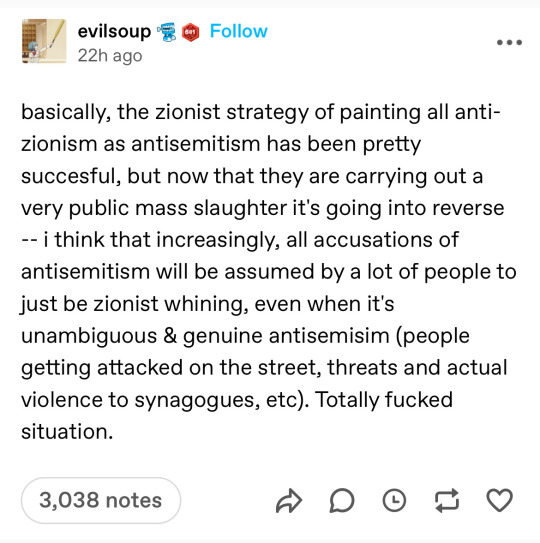
did some digging bc I got an ask about it but uuuh don't platform this dude. this post is fine, but he's an antisemite and staunch anti-theist. here's a long post where he says his ideal world would be one where all religion is wiped away and kosher becomes the new fad diet and the hajj is a drunken weekend holiday
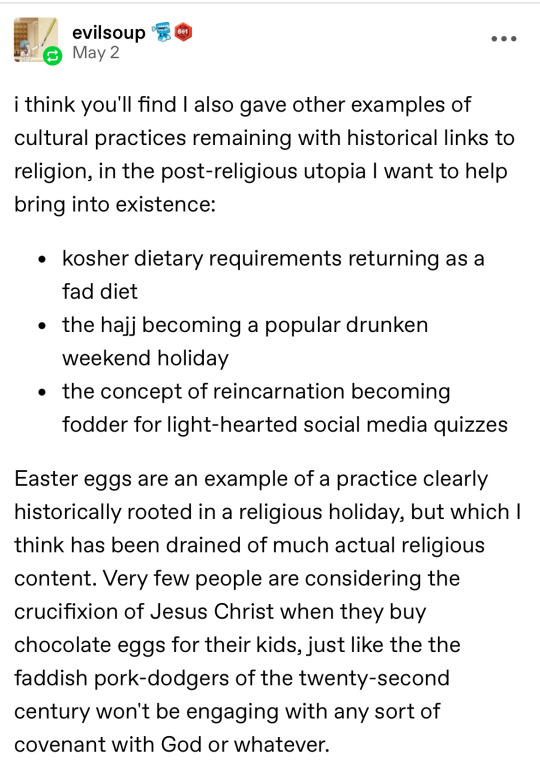
reblogged w these tags on another anti-theist post

reblogged this shitty antisemitic post (and if you think it's not antisemitic please read these responses & also note that op's source for all this is antisemitic conspiracy bullshit widely derided by the academic community)
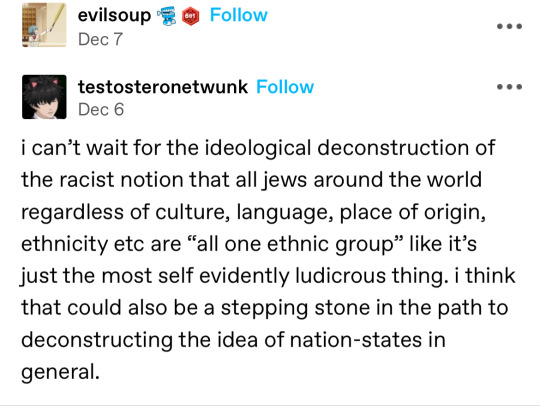
made this whole post arguing w ppl that napoleon releasing jews from the ghettos to christianize them wasn't antisemitic, was in fact the opposite of antisemitic, and what evilsoup also wants to do
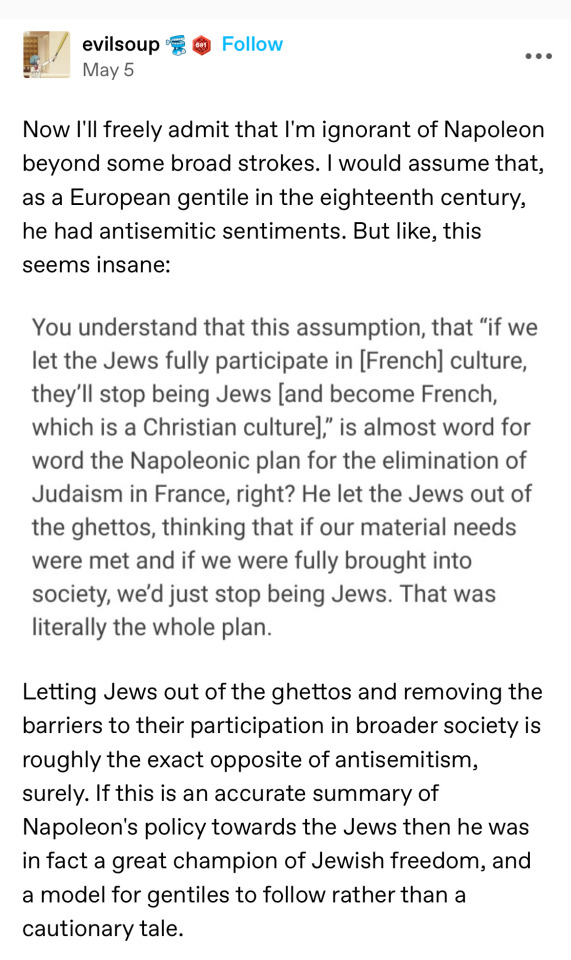
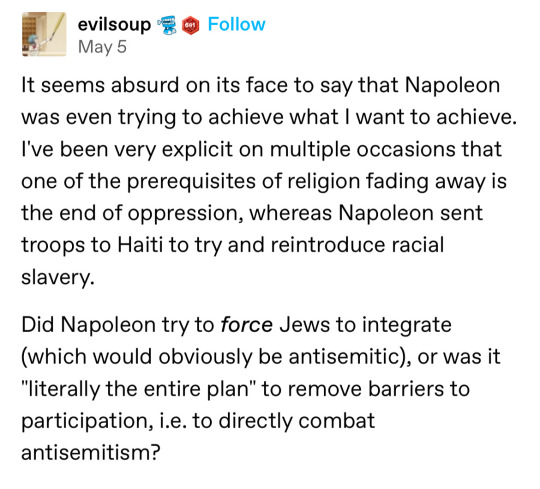
anyway yeah I don't think we should be reblogging any posts abt antisemitism from him when he clearly doesn't think it's a real issue. fuck this dude. and this probably isn't even all of it it's just what I found in legitimately like 10 minutes of searching his blog
172 notes
·
View notes
Text
The ineffables fell in love, and God & Satan decided to make a bet on true love.
DO NOT ASK NEIL ABOUT FAN THEORY
Okay so, this is kind of a crack theory. But if this blog is for anything, it's for divulging my crack theories, and not feeling bad about it. My other blog is where I act like a properly sane person.
I have had a lot of nebulous thoughts that led to this theory but there was one bit of dialogue that tied it all together for me, that we will discuss at the very end. I'm going to start by laying out each of my *Clues* for you below, and we'll tie all my threads together by the end. Shall we begin?

Sanctuary Lights
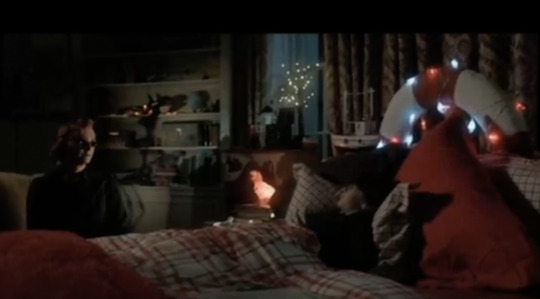
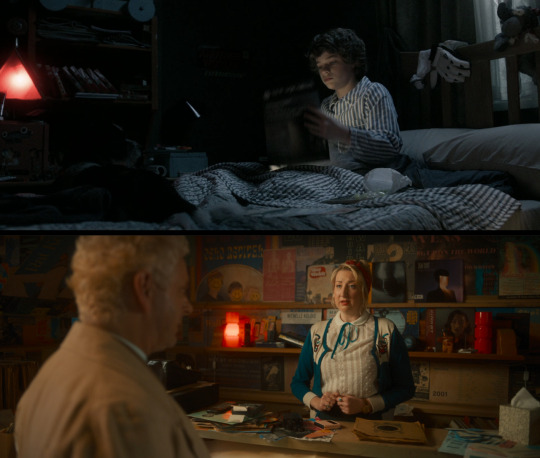
Warlock, Adam, and most interestingly Maggie all have a single red light displayed on their right hand side of their "rooms". The symbolism of the right hand side implies the sacred, good, right, and stable. It's also where we find Aziraphale in reference to Crowley when they are balance and harmonious, Aziraphale is on Crowley's right.
A sanctuary light, is a light that shines before the altar of sanctuaries in many jewish and christian places of worship. A lit Sanctuary Lamp signifies the presence of God in the tabernacle that contains the Eucharist, and are traditionally red.
It's interesting that these three characters are linked via this specific visual. The assumed anti-christ, the actual anti-christ, and the local record shop owner? All of whom were somewhat under the watchful eyes of Crowley and Aziraphale at some point, but more-so Aziraphale. The right hand sidedness of the lights is initially confusing as you might expect Adam's to be on the left given he is the son of Satan, but we do know at the end of season one that he isn't good or bad, but rather, very human. What is this telling us about Maggie? I am a "Greasy Johnson is Jesus" truther but my mind wanted to go, "Oh maybe Maggie is Jesus!"
Aziraphale & Crowley's Angelic Playlist
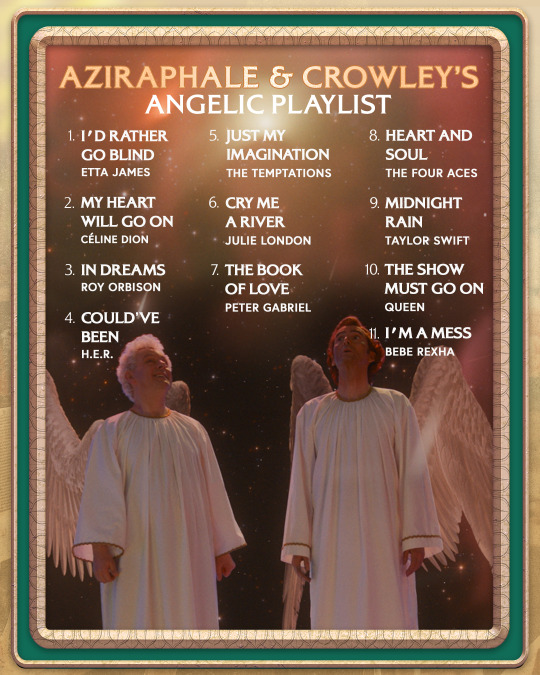
Not Aziraphale and Crowley's Earthly Playlist, no no no, their Angelic Playlist.
These songs definitely tell a story. They are full of heartbreak, and longing, misunderstanding and disagreement, all while flowing with an undertow of deep love. And don't even get me started on The Book of Love. I have loved that song for so long and when I saw that was one of Neil's 3 picks for this playlist I did tear up a bit.
These songs no doubt illustrate the final 15 minutes. Aziraphale wants to leave, he needs to go to heaven to fix things, to protect humanity, and Crowley is hurt, he wants Aziraphale to run away with him. But, could they also mirror something else? Could they mirror Crowley and Aziraphale's disagreement before the Great War and the Fall? I mean it is their Angelic playlist afterall. It could have very easily been their any-other-adjective playlist.
In the Before the beginning scene we are shown, Angel!Crowley wants to stand up for the universe, and protect his creations, and Aziraphale wants to put his head down and hide. Angel!Crowley tried to do what he thought was right, and it resulted in a boiling pool of sulphur. He doesn't think Aziraphale can succeed at what he has already failed to do. This time, Aziraphale is the one who wants to stand up to Heaven and protect creation and humanity, and Crowley knows what that looks like, so he just wants to run and keep Aziraphale safe.
Maybe that's why the final fifteen hurts so much, even if they might not remember it well, because maybe they've been through this before, before the beginning.
Magic shop Ventriloquist Dummies

Do you see the resemblance here? I really wish we could read their name tags clearly, I feel like that would give us a ton of information, and with time, hopefully we'll get that opportunity. And we do have information that each doll is named and they apparently had enough information for each of them and their dress that it warranted a spreadsheet so it must've been detailed and important. You can read that in this tweet from Mickey Ralph's twitter:
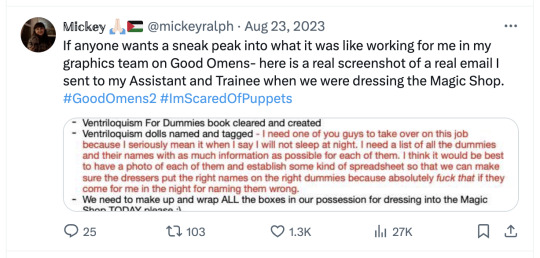
From Mickey Ralph, Good Omens graphic designer's twitter: "I need a list of all the dummies and their names with as much information as possible for each of them. I think it would be best to have a photo of each of them and establish some kind of spreadsheet so that we can make sure the dressers put the right names on the right dummies"
It has been vaguely stated the likenesses of the dolls was not purposeful here:

But I'd like to posit a guess that maybe this answer just means they didn't create the dolls to look like A & C, but maybe found ones that looked like them.
Do the dolls mimic the hierarchy of God and heaven? Why are there two Crowley's? Why is Muriel so far up? Was she a high ranking angel before she was possibly demoted and became a 37th order scrivner?
@noneorother has a more in depth analysis of the puppets here, if you'd like to read their take.
"Enough to Make you Believe in True Love?"
This dialogue is what set off the chain reaction that led to my ultimately writing this post. Don't remember this quote? It's easy to miss and seemingly unimportant. Just after Gabriel recovers his memories and Shax accuses Beelzebub of being a traitor we get this:
Beelzebub: "I didn't collaborate with Heaven, anymore than Gabriel collaborated with Hell. I just found something that mattered more to me than choosing sides"
Maggie: "That's really sweet"
Nina: "Enough to make you believe in true love?"
Maggie and Nina who are still in the bookshop and watching these events unfold have been silent, but finally share these two lines. And I finally noticed, it's kind of a weird thing for Nina to say to Maggie, no? Why wouldn't Maggie believe in true love? Why does Nina think Maggie wouldn't believe in true love? We've seen Maggie pining over Nina and saying she's in love with her earlier in the season so why might a romantic who's never even talked to the woman she claims to be in love with not believe in true love, and why might her and Nina have discussed that before?
Is this little aside a conversation really being had by Nina and Maggie?
The Job Bet
That's why he's perfect for the bet! This is the final piece to my puzzle before I wrap up my ramblings and try to coherently tell you how they fit together. God and Satan make a bet, to see if Job is really truly righteous, and loves God, even if She takes away everything she's given him. They aren't above making bets about their creations, and taking everything away from them, testing them to destruction.
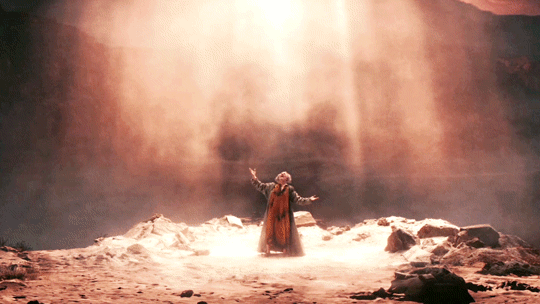
Conclusion
Let me weave you a web... The Starmaker, and Aziraphale meet in what we see is the first scene of season two. Maybe in the time before the fall they become close, and fall in love. Angels shouldn't have free will so that shouldn't be possible right? God and Lucifer!Satan? (maybe?) take notice and talk about it, maybe how they did with Job? Maybe they disagree about true love. Maybe God insists that in the ineffable plan, Crowley and Aziraphale will always end up together no matter what. Satan disagrees, they can be driven apart. They make a deal, a bet. The fall is inevitable, its ineffable, so they ensure Crowley and Aziraphale end up on either side of the factions, God lets Satan destroy everything they have, and then they'll see...
Fast forward to The Great War, the Starmaker doesn't really want to rebel like the other angels but gets swept up on their side of things, on the losing side, maybe with a bit of divine or demonic intervention. All he ever did was ask questions! He and Aziraphale are separated. Later, the Serpent of Eden slithers up next to the Angel of the Eastern Gate and strikes up a conversation. They don't remember each other, maybe a vague impression of familiarity, but the demon can't help but be drawn to the angel.
God and Satan we now know must chat about the goings on of Earth, making bets about Job and all that. That's at least my possible explanation for why Nina and Maggie have those weird lines during the Ineffable Bureaucracy reveal. Maybe God and Satan popped in to check on their bet and see what was happening with their stupid free wheeling creations?
Despite everything Aziraphale and Crowley are still together after all this time, and they do love each other. But they can always continue to be tested, even to destruction, or so they may believe.
Hey look, I'm not saying any of this is at all accurate but it was fun to come up with hehe.
#good omens#good omens meta#good omens 2#crowley x aziraphale#good omens theories#crowley#michael sheen#aziraphale#david tennant#good omens clues#good omens theory#good omens clue#good omens crack theory#you dont have to take this seriously#like at all i wont be disappointed#but it was fun to write
108 notes
·
View notes
Note
I'm sorry to always be the unhinged fucking lunatic in your asks, but you're one of the only Israelis who doesn't lecture your anons for being "too angry" at the bullshit so back here I go.
At this point it's just so fucking annoying hearing the braindead takes of the Mein Kampf left. "Oh how DARE Israel (<with some incorrect third grader misspelling) complain about the drone attacks! They have the Iron dome! What's there to complain about??? nobody was hurt anyway, and Iran is totally justified!" but if Israel HADN'T been using the iron dome this time, the Islamic holy site of the Dome of the Rock would've suffered heavy bombardment and the same braindead leftists would cry that "Why didn't Israel protect this holy site of Islam!!! I bet the strike wasn't Iranian at all, but Israeli all along!!! Nasty vermin jew- I mean zionists!!! muh apartheid genocide!!!"
Israel can't win if they use the Iron dome, Israel can't win if they don't use the Iron dome, Israel is somehow anti-arab and islamophobic even when they choose to defend a structure that if blown up by Iran, would allow them to eventually make a claim of their own to get back Judaism's holiest site OF OVER TWO AND A HALF THOUSAND YEARS.
Meanwhile not a singular word of condemnation to Iran for even risking the targeting of one of Islam's most holy sites (I'm not even mentioning the obvious targeting of Israeli civilians because the lives of Israelis themselves clearly mean jack shit to those people). To these people, Iranian aggression is always justified. All aggression of all Muslims and Christians is always justified. but heaven forbid Jews do anything at all, ever, whether to defend themselves or not to.
Maybe next time when Iran sends ten thousand drones instead of 185, Maybe the degenerates cheering in the streets would stop mid-cheer once some group other than the Jews has to suffer casualties.
To clarify, I am NOT calling for the destruction of ANY group's holy sites, but when we're being shown that it ABSOLUTELY IS within the realm of possibility, the "protect Muslims/Arabs/Palestinians at all costs because they're a minority" crowd doesn't seem to mind any such destruction, should it happen at the hands of an Islamic country. It'll only ever be considered bad to them if they can find some Jews to blame for it.
Fucking clown world.
(And obviously, stay safe)
ur right and u should say it
#israel#palestine#leftoid westoid antisemitism comes in many shapes#the shapes r very simple yet the adult toddlers still cant place them in their correct respective holes#smh
71 notes
·
View notes
Text
“…In the Early Middle Ages, most French Jewish communities had settled in the southeast, on the shores of the Mediterranean. Although there were few Jews north of the Alps, they were the focus of restrictive laws that limited their freedom of movement and their ability to interact with Christians.
For instance, a mid-fifth-century council held in Troyes, northern France, prohibited Jews from going out of their houses to have any form of communication with Christians during Eastertide – a time celebrating the death and resurrection of Jesus Christ, therefore a particularly tense period for the Jewish community who were accused of his murder.
A century later, other councils banned the appointment of Jews to any public office that would put them in a position of superiority over a Christian. Jews were no longer allowed to work on Sundays and were to refrain from eating with Christians. Intermarriage between Jews and Christians was forbidden in early Roman law codes, a prohibition early medieval law codes reiterated.
At that time, the fragile state of Christianity – still a relatively new religion in Europe – fueled the clergy’s anxieties. Clergymen were afraid Jewish people would “pollute” the minds of Christians and turn them away from the Church. They advocated relentlessly for their conversion to Christianity. This project was finally successful in the seventh century when the Merovingian king Dagobert called for the baptism or expulsion of the Jews of his kingdom. More than a century of political unrest followed.
Dagobert’s rule, during which Jewish communities grew again in size. By the end of the year 800, Charlemagne became emperor. Charles’ attitude towards the Jews was ambivalent but more open than before. Carolingian capitularies reiterated certain older restrictions, and the chancery levied heavy taxes on the Jews. Because of these taxes, Jews constituted a reliable source of income for the chancery. Charlemagne, therefore, granted the Jewish communities privileges safeguarding their autonomy and their rights to practice their religion.
For instance, Jews responded to their own laws for all matters concerning “low justice,” such as marriage and business contracts, small offences, and inter-community disputes. Murders, however, were to be tried by the Christian authorities. Until the First Crusade, the lives of medieval French Jews were relatively peaceful – only two episodes of violence were reported in the early eleventh century. But things were about to change.
Set in the context of religious zeal, the Crusades stirred the pot of hate. Pope Urban II came to France in 1095 and preached the First Crusade with tremendous success. The message was clear: Christians should take up arms to fight the enemies of God and Christianity. While the pope clearly laid out that the point was to free Jerusalem, some interpreted it differently. According to chronicler Guibert of Nogent (1055–1124), a group of men from Rouen, Normandy, had decided to leave for the East, but they began questioning their purpose:
“We want to attack the enemies of God in the east after traveling great distances, while before our eyes are the Jews, of all races God’s greatest enemy.”
Pondering their options, the men took their weapons, captured many Jews, and killed them, adults and children alike, only sparing those who accepted conversion. Then they left for Jerusalem.
The Crusades fueled dozens and dozens of pogroms across Western Europe. In the late eleventh and early twelfth century, the pressure to convert was immense, and the risks of refusing to convert were even greater. A mid-twelfth-century Christian chronicler, Richard of Poitiers, acknowledged the great sufferings of the Jewish people at the outset of the early crusades, of which he underlined the unfairness. But the anti-Jewish sentiment in the Christian communities only grew stronger.
In the aftermath of the crusades, European Jews were at the center of rumours propelled by distrust and suspicion. In Blois, France, in 1171, Christians accused members of the Jewish community of having murdered Christian children during religious rituals. Called the “blood libel,” these accusations first appeared in England and were attested across Western Europe from the twelfth century to the modern era. In Blois, the blood libel accusations lead to the dramatic death of more than 30 members of the community. The survivors’ estates were confiscated. Ten years later, King Philippe Augustus expelled the Jews from the royal domain.
Anti-Semitism received the Church’s support in the early thirteenth century at the Fourth Lateran Council (1215). The council invited kings and rulers to force the Jews of their kingdoms to wear a distinctive symbol on their clothes or a specific hat that would make them immediately recognizable by Christians. In 1269, Louis IX of France made the symbols mandatory.
The thirteenth century also witnessed the forced segregation of Jews to specific areas. Traditionally, Jews lived together in neighbourhoods often nicknamed juiveries (Jewries). Paris counted four juiveries at that time. When Saint Louis made the distinctive symbols mandatory, he also forced the Jews to live in Jewries. Forced residence in Jewries signalled the birth of “ghettos,” neighbourhoods reserved for the Jewish population of a given town.
In the aftermath of the fourteenth-century plague, many Jewries were equipped with gates locked at night to prevent people from entering or exiting the district. Jewries started to turn into ghettos. The point of the ghettos, some rulers argued, was to protect the Jews from the violence Christians perpetrated against them. But ghettos also functioned as traps and participated in marginalizing the French Jewish communities.
The first decades of the fourteenth century were marked by an economic crisis and recurring food shortages. Anti-Semitism was on the rise again. In 1319 and 1321, Parisians – Christians – manifested their hatred toward Jews by publicly burning the Talmud. The plague signalled a new era of pogroms and violence against the Jews, who became the “scapegoats” of the crisis. The chronicler Jean de Venette witnessed and described the consequences of the plague for the Jews:
Some said that the pestilence was the result of infected air and water… and as a result of this idea, many began suddenly and passionately to accuse the Jews of infecting the wells, fouling the air, and generally being the source of the plague. Everyone rose up against them most cruelly. In Germany and elsewhere – wherever Jews lived – they were massacred and slaughtered by Christian crowds and many thousands were burned indiscriminately.
As Venette states, Christians accused the Jews of having poisoned wells to spread the disease. In Toulon, southern France, 40 Jews were killed by fire right after the epidemic started. In Strasbourg, northeastern France, in 1349, hundreds of Jews who lived in the city’s ghetto were locked up in a building by angry Christians and set on fire. Similar massacres happened in the pontifical city of Avignon, and in Narbonne, Carcassonne, and Toulouse, to cite but a few southern French examples.
Pope Clement VI (1291–1352) issued a bull forbidding the killing of Jews, but to no avail. Distrust and hatred were so intense that the city of Strasbourg, in the Rhine valley, expelled all Jews from its jurisdiction and forbade them from entering the city. This law was only removed from the city’s policies during the French Revolution in the late 1780s.
In many ways, medieval anti-Judaism paved the way for modern anti-Semitism. From accusations of greed and avarice to the blood libel, from the wearing of distinctive symbols to mandatory residence in ghettos, the Middle Ages witnessed the development of a series of stereotypes and a system of repression that had repercussions far into the twentieth century and the modern day.
But the Jewish communities of medieval France did not always live in fear. They enjoyed times of peace and independence and were, usually, relatively integrated into urban communities. Their role in the intellectual renaissance of the twelfth century is especially remarkable and well-marked in historiography.”
- Lucie Laumonier, “Hostility Against the Jews in Medieval France”
280 notes
·
View notes